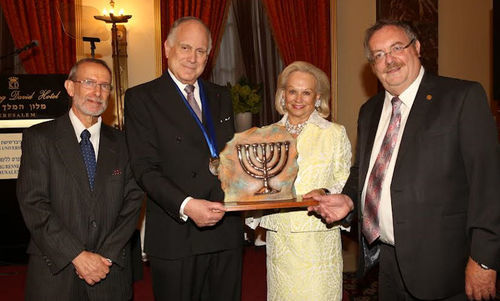'The era of the quiet Jew is over': Ronald Lauder lays out vision for future of Jewish people
14 Jun 2016The Ingeborg Rennert Center for Jerusalem Studies of Israel’s Bar-Ilan University on Tuesday honored World Jewish Congress President Ronald S. Lauder with the prestigious Guardian of Zion Award for his efforts in the perpetuation and strengthening of Jerusalem.
 In his acceptance speech, Lauder outlined the challenges facing the Jewish world today and spoke about his vision for contending with contemporary anti-Semitism. “Over the last 20 years, and for the first time since the Holocaust, anti-Semitism is acceptable again,” Lauder said. “Unlike the anti-Semitism of the past, today it comes not just from the Far-Right, but increasingly it comes from the Far-Left. And the new target for this age-old hatred is not the ‘International Jew,’ as Henry Ford called us. Today, it is the Jewish state of Israel, which is constantly vilified throughout the media, on the internet, at the United Nations, and on almost every college campus.”
In his acceptance speech, Lauder outlined the challenges facing the Jewish world today and spoke about his vision for contending with contemporary anti-Semitism. “Over the last 20 years, and for the first time since the Holocaust, anti-Semitism is acceptable again,” Lauder said. “Unlike the anti-Semitism of the past, today it comes not just from the Far-Right, but increasingly it comes from the Far-Left. And the new target for this age-old hatred is not the ‘International Jew,’ as Henry Ford called us. Today, it is the Jewish state of Israel, which is constantly vilified throughout the media, on the internet, at the United Nations, and on almost every college campus.”
Lauder went on to say: “Let’s make one thing crystal-clear right now. When someone says they are not anti-Jewish, they are only anti-Israel, that is a lie. When you hold the only Jewish nation to a different standard than any other country, when you make up lies about the only Jewish nation, its past and its present, and when you want the only Jewish nation on earth to disappear, that makes you an anti-Semite. Pure and simple.”
The WJC president expressed disappointment in the United Nations’ resolve at contending with these issues, saying international body was losing legitimacy as it allowed anti-Jewish sentiment to undermine it.
Lauder said that for Jews today, “our destiny is in our own hands.”
The World Jewish Congress had come a long way since its founding in 1936, Lauder said, from the days when it had to turn to the world for help. But now, he pointed out, “the era of the quiet Jew is over.”
Lauder said the WJC was working to engage young Jewish leaders, including the flagship WJC-Jewish Diplomatic Corps program, a group of more than 200 young professionals who assist the WJC in its diplomatic and outreach endeavors as emissaries in their respected countries around the world. “I intend to make our young people, proud of their heritage again. I want them to have the same pride that we had when we were younger.”
Lauder also discussed the WJC’s efforts in combating attacks on Israel in the legal realm and on campuses, and proposed to enhance Jewish public relations efforts, “so that we, not our enemies will define who we are."
He ended his speech with a plea: "This is the job before us now. We have to help our children and our grandchildren dust off their hearts, we have to help them re-discover that Jewish flame inside them. This isn't just important for Jews, it’s important for everyone, Jews and gentiles, because for over 5,000 years, that flame has been lighting the entire world."
The Ingeborg Rennert Center for Jerusalem Studies was established at Bar-Ilan University in 1995 by US Jewish community leaders Ingeborg Hanna and Ira Leon Rennert as an expression of their heartfelt commitment to the preservation and advancement of Jerusalem's unique heritage. Integrating studies on the history, archaeology, geography, demography, economy and sociology of Jerusalem, the Rennert Center has become the foremost academic center in the international academic community studying aspects of Jerusalem's past and present.
This is the 20th year the Rennert Center is conferring the Guardian of Zion Award. Last year's award was bestowed upon former US Senator Joe Lieberman. Additional recipients have included Jonathan Sacks, James S. Snyder, Dore Gold, Malcolm Hoenlein, Caroline Glick, Norman Podhoretz, Daniel Pipes, William Safire, Arthur Cohn, Charles Krauthammer, Cynthia Ozick, A.M. Rosenthal, Herman Wouk and Elie Wiesel.
Photo credit: Yoni Reif